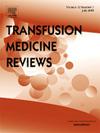Artificial Intelligence and Machine Learning in Transfusion Practice: An Analytical Assessment
IF 2.5
2区 医学
Q2 HEMATOLOGY
引用次数: 0
Abstract
Transfusion medicine is vital to healthcare and affects clinical outcomes, patient safety, and system resilience while addressing challenges such as blood shortages, donor variability, and rising costs. The integration of artificial intelligence (AI) and machine learning (ML) presents new opportunities to improve clinical decision-making and operational effectiveness in this field. This structured narrative review identified and evaluated studies applying AI and ML in transfusion medicine. A search of PubMed and Scopus for articles published between January 2018 and April 2025 yielded 565 publications. Studies were included if they applied AI or ML techniques, focused on transfusion management or decision support, and were evaluated using electronic health records or expert review. Four exemplar studies were selected, each representing a distinct AI paradigm: supervised, unsupervised, reinforcement, and generative learning. These studies were critically appraised for methodological rigor, clinical relevance, and potential for implementation in practice. The reviewed studies reflected a clear shift from traditional analytic methods toward more advanced computational approaches to improve prediction accuracy, optimize resource allocation, and support clinical decision-making. Three overarching themes emerged: the need to balance model complexity with interpretability and clinical feasibility; the impact of data quality and preprocessing on model performance and fairness; and the barriers to broader applicability and cross-institutional deployment. As technological barriers continue to decline, future challenges will increasingly center on privacy regulations, infrastructure constraints, and aligning model complexity with practical utility. Thoughtful integration of these considerations through scalable, clinical-grade, and transparent solutions will be critical in realizing the full potential of AI and ML in transfusion medicine.
输血实践中的人工智能和机器学习:分析性评估。
输血医学对医疗保健至关重要,影响临床结果、患者安全和系统弹性,同时应对血液短缺、献血者多样性和成本上升等挑战。人工智能(AI)和机器学习(ML)的融合为提高该领域的临床决策和操作效率提供了新的机会。这篇结构化的叙述性综述确定并评估了在输血医学中应用人工智能和ML的研究。在PubMed和Scopus上搜索2018年1月至2025年4月间发表的文章,得到565篇。如果研究应用了人工智能或机器学习技术,专注于输血管理或决策支持,并使用电子健康记录或专家审查进行评估,则纳入研究。选择了四个范例研究,每个研究都代表了一个不同的人工智能范式:监督学习、无监督学习、强化学习和生成学习。这些研究在方法的严谨性、临床相关性和在实践中实施的潜力方面得到了严格的评价。回顾的研究反映了从传统分析方法向更先进的计算方法的明显转变,以提高预测准确性,优化资源分配,并支持临床决策。出现了三个总体主题:需要平衡模型的复杂性与可解释性和临床可行性;数据质量和预处理对模型性能和公平性的影响;更广泛的适用性和跨机构部署的障碍。随着技术壁垒的不断下降,未来的挑战将越来越多地集中在隐私法规、基础设施约束以及将模型复杂性与实际效用相结合上。通过可扩展、临床级和透明的解决方案将这些考虑周到地整合在一起,对于实现人工智能和机器学习在输血医学中的全部潜力至关重要。
本文章由计算机程序翻译,如有差异,请以英文原文为准。
求助全文
约1分钟内获得全文
求助全文
来源期刊

Transfusion Medicine Reviews
医学-血液学
CiteScore
11.60
自引率
0.00%
发文量
40
审稿时长
21 days
期刊介绍:
Transfusion Medicine Reviews provides an international forum in English for the publication of scholarly work devoted to the various sub-disciplines that comprise Transfusion Medicine including hemostasis and thrombosis and cellular therapies. The scope of the journal encompasses basic science, practical aspects, laboratory developments, clinical indications, and adverse effects.
 求助内容:
求助内容: 应助结果提醒方式:
应助结果提醒方式:


